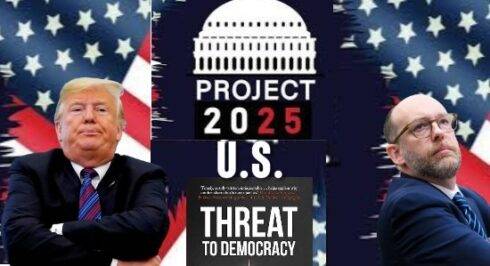A Fragile American Democracy | President Donald Trump has signed a sweeping executive order that extends presidential oversight over independent government agencies, igniting widespread legal and political debates. The directive places agencies such as the Federal Election Commission (FEC), the Federal Communications Commission (FCC), the Federal Trade Commission (FTC), and the Securities and Exchange Commission (SEC) under the direct supervision of the White House Office of Management and Budget (OMB). This move has drawn criticism for potentially eroding the independence of regulatory bodies that have traditionally functioned outside direct presidential influence.
Under the executive order, OMB Director Russell Vought has been assigned the task of evaluating agency performance and ensuring their policies align with the administration’s objectives. This change grants Vought the power to review and modify agency budgets, effectively consolidating executive control over regulatory enforcement and decision-making. Historically, these agencies have operated with autonomy to prevent political interference, making this order a significant deviation from long-standing governance norms.
A Fragile American Democracy: Legal and Constitutional Challenges Ahead
A Fragile American Democracy: Trump’s executive order is likely to face immediate legal challenges, primarily on constitutional grounds. Critics argue that the directive undermines the separation of powers, a foundational principle of American democracy, as Congress originally designed independent agencies to function without direct executive control. The Supreme Court has deliberated on the concept of the unitary executive theory, which posits that the president has total authority over the executive branch. This order may serve as a new legal test case to determine the extent of presidential power.
Congressional opposition is also mounting, with lawmakers across the political spectrum voicing concerns about executive overreach. Some members of Congress are exploring legislative countermeasures to reaffirm agency independence, though the feasibility of such efforts remains uncertain given the current political landscape. If the legal challenges escalate, the Supreme Court could ultimately be tasked with deciding whether the order violates constitutional limitations on executive authority.
A Fragile American Democracy: Political and Electoral Implications
A Fragile American Democracy: The implications of this executive order on U.S. elections have raised alarm bells among democracy advocates and legal scholars. By centralizing control over the FEC, the Trump administration could potentially influence the enforcement of campaign finance laws, opening the door to politically motivated regulatory changes. The FEC plays a critical role in ensuring fair elections, and any perceived interference could undermine public trust in the electoral process.
Beyond election oversight, the executive order sets a precedent that future administrations, regardless of party, could leverage to exert greater influence over regulatory agencies. If upheld, this move could reshape the balance of power between the executive branch and independent institutions, altering the integrity of governance for years to come.
Economic and Business Fallout
A Fragile American Democracy: The financial and business communities have also voiced concerns over the order, warning of potential regulatory instability. Agencies such as the FTC and SEC are responsible for enforcing antitrust laws, overseeing financial markets, and ensuring fair corporate practices. Increased presidential influence over these entities could lead to shifts in enforcement priorities, creating uncertainty for businesses and investors.
The FCC’s expanded oversight under the executive order has also raised fears regarding media regulation and potential censorship. With the agency now more susceptible to direct political influence, key policies such as net neutrality and media ownership regulations could be reshaped to reflect the administration’s interests rather than independent regulatory assessments. This development could have far-reaching consequences for press freedom and the broader communications landscape.
What Comes Next?
A Fragile American Democracy: As legal challenges mount, courts will play a crucial role in determining whether Trump’s executive order stands. Lawsuits from advocacy groups, regulatory experts, and members of Congress are expected to challenge the directive’s constitutionality. Meanwhile, legislative efforts to curb executive overreach may face an uphill battle in a divided Congress.
With the 2024 election on the horizon, this executive order is set to become a central campaign issue. Presidential candidates and lawmakers will be forced to address the growing concerns over executive authority and the future independence of federal agencies. Whether upheld or struck down, this directive represents a significant moment in the ongoing debate over presidential power, the rule of law, and the resilience of American democracy.
Table of Contents
Discover more from OGM News NG
Subscribe to get the latest posts sent to your email.














